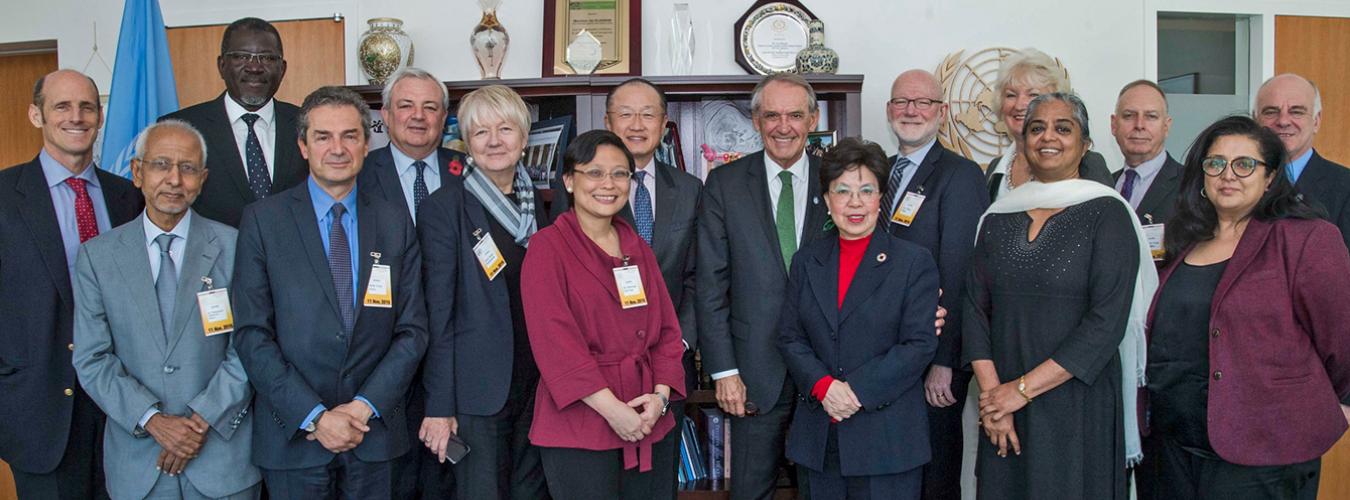
The Global Health Crises Task Force was established by former UN Secretary-General Ban Ki-moon for a period of one year, beginning on 1 July 2016.
Purpose
The Global Health Crises Task Force was established by former UN Secretary-General Ban Ki-moon in 2016 to support and monitor the implementation of the recommendations of the High-level Panel on the Global Response to Health Crises, issued in its report on “Protecting humanity from future health crises” (A/70/723). The Task Force sought to ensure that the implementation of the Panel’s recommendations was aligned with the observations of the Secretary-General as set out in his report on “Strengthening the global health architecture” (A/70/824).
The Task Force also sought to catalyse action on the Panel’s recommendations, enhance the preparedness of the UN system, maintain the profile of global health issues, and make substantive contributions to strengthening the global capability for responding to health emergencies.
Ways of working
In its work the Task Force focused on what is needed for effective action on health crises. It highlighted recommendations that were not being implemented fully, identified bottlenecks to implementation, and proposed ways in which progress on recommendations can be supported. It also considered “tabletop” simulations and other mechanisms to assess the preparedness of the UN system to address health emergencies.
The Task Force met on a quarterly basis and provided quarterly reports to the Secretary-General on the progress of the Panel’s recommendations. It also brought to his attention issues relating to emerging health crises and to gaps or weaknesses in the global health architecture.
Read the workplan of the Task Force.
Priority areas
The Task Force identified nine priority areas for monitoring over the course of 2016-17:
- Strategic support for national health systems to prevent global health crises
- Integrating communities in efforts to prevent global health crises
- Supporting regional arrangements to prevent and respond to health crises
- Strengthening UN system capacity during health emergencies
- Testing capacities and processes for global health crises response through simulations
- Catalysing focused research and innovation relevant to global health crises
- Securing sustainable financing for work on global health crises
- Focusing attention on the gender dimensions of global health crises
- Ensuring health crises are a priority on global political agendas
Membership
The Task Force was co-led by Ms. Amina J. Mohammed, United Nations Deputy Secretary-General, by Dr. Margaret Chan, Director-General of the World Health Organization (WHO), and by Dr. Jim Yong Kim, President of the World Bank Group. The membership of the Task Force was drawn from across the United Nations system and also included external experts. These were distinguished individuals with backgrounds in infectious diseases, community health care, public health and development. They also have experience in risk assessment, implementation of humanitarian action, management of outbreak responses, financing, research and innovation. Dr. David Nabarro, the Secretary-General’s Special Adviser on the 2030 Agenda for Sustainable Development and Climate Change, provided support to the Task Force.
See the membership of the Task Force.
Related events
- General Assembly briefing on health issues (4 May 2017) (UN Web TV)
- General Assembly briefing on UN system coordination on outbreaks and health emergencies (11 November 2016) (UN Web TV)
- General Assembly briefing on strengthening the global health architecture (20 June 2016) (UN Web TV)
Related reports
- Report of the Independent Oversight and Advisory Committee for the WHO Health Emergencies Programme (May 2017)
- Report of the World Health Organization on the state of health security (November 2016)
- Report of the Director-General of the World Health Organization on the lessons learned in the public health emergency response to and management of previous international crises with health consequences (November 2016)
- Report of the High-Level Commission on Health Employment and Economic Growth (September 2016) (World Health Organization)
- Report of the High-Level Panel on Access to Medicines (September 2016)
- Report of the Review Committee on the Role of the International Health Regulations (2005) in the Ebola Outbreak and Response (May 2016)
